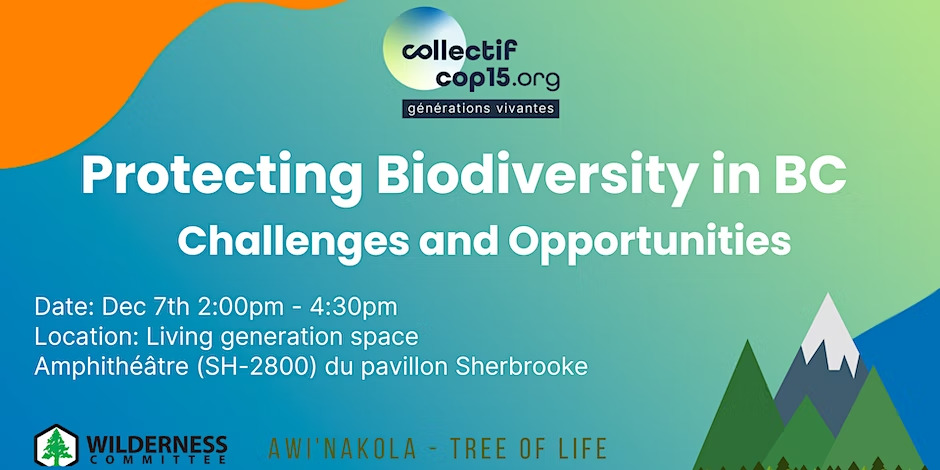Protecting Biodiversity in BC - Challenges and Opportunities

Date: December 7 from 2 - 4pm (EST)
Location: ESPACE GÉNÉRATION VIVANTE, Amphithéâtre (SH-2800) du pavillon Sherbrooke. 200 rue Sherbrooke Ouest. Montréal (Québec) H2X 3P2
Reserve your spot: Protecting Biodiversity in BC - Challenges and Opportunities
OVERVIEW
BC has more biodiversity than any other province or territory in Canada, yet is also home to the most species at risk. For Canada to meet its biodiversity targets, BC must step up to the plate to increase protection, while ensuring an Indigenous rights-based approach is followed.
This event will explore how the current framework for biodiversity protection in BC is failing and how to improve it. Panel members will discuss Indigenous Protected and Conserved Areas (IPCAs) and how both the provincial and federal governments are slow to get on board with them despite numerous Indigenous Nations wanting to move forward with their protected area proposals. We will discuss efforts to protect marine ecosystems and salmon species relying on healthy and safe habitat. We will cover the need for biodiversity legislation that centres Indigenous leadership, is aligned with United Nations Declaration on the Rights of Indigenous Peoples (UNDRIP), and effectively protects ecosystems and recovers species at risk. Lastly, we will explore the new British Columbia – Canada Nature Agreement and how this process has excluded the voices and knowledge of Indigenous communities.
All topics will include a vision for the future that offers solutions.
Our panel members include Chief Ernest Alfred, who is working to protect marine ecosystems in the Broughton Archipelago; Gwen Bridge of Saddle Lake Cree Nation, who develops relationships that advance reconciliation; Lauren Terbasket from the Okanagan Nation, who is involved in the ongoing process of establishing the nʔaysnúlaʔxʷ (Ashnola) protected area;, and Victoria Watson, a Haudenosaunee and Scottish lawyer working to ensure that a new BC biodiversity law enhances Indigenous sovereignty and governance over their territories while safeguarding biodiversity.
MODERATORS
Charlotte Dawe and Mark Worthing (English)
Get to know the panelists
1. Gwen Bridge
Gwen is a member of the Saddle Lake Cree Nation and for over 20 years and has worked with First Nations, governments, and others, across North America, developing relationships that advance reconciliation. Gwen negotiates and advises on strategy and policy towards implementing Indigenous Knowledge and how to better consider Indigenous Knowledge in collaborative land use planning and forestry related climate change considerations.
2. Lauren Terbasket
Lauren Terbasket is from the Okanagan Nation and a member of the Lower Similkameen Community. She is working to establish the nʔaysnúlaʔxʷ (Ashnola) protected area and she is a lead negotiator for Lower Similkameen Indian Band on the South Okanagan National Park Reserve. She is a masters candidate in leadership and training through Royal Roads University. Lauren has extensive experience in Indigenous education including both curriculum development and teaching, cultural community development, and environmental conservation.
3. Victoria Watson
Victoria Watson is a lawyer of mixed Haudenosaunee and Scottish descent. As a law reform specialist at Ecojustice, she develops legislative reform that centres intersectional environmentalism and legal pluralism, decolonizes state-based approaches, and reconciles state and Indigenous sovereignties. Her current work focuses on environmental justice and equity, and biodiversity and ecosystem stewardship.
4. Chief Ernest Alfred
K̓wak̓waba̱'las, Chief Ernest Alfred is a traditional and elected leader of the Namgis First Nation. Ernest has been at the forefront of protecting the marine environment, Indigenous Title and Rights and Pacific wild salmon. Ernest led a 284 day protest occupation at the Swanson Island fish farm, which resulted in the closure of 35 fish farms in the Discovery iIslands and Broughton Archipelago. He is an elementary school teacher and runs the cultural and language program at Alert Bay school, and is a strong advocate for the children, youth and the next generation.
PANEL TOPICS
Gwen Bridge:
The BC and federal government of Canada have been negotiating and working towards a British Columbia – Canada Nature Agreement in order to strengthen conservation province wide. Yet, First Nations’ communities have been shut out of the process. This is especially concerning as resolutions on the post-2020 global biodiversity framework and its area-based conservation targets include calls for appropriate recognition of the rights of Indigenous Peoples to their lands, territories and resources, as set out in UNDRIP, free, prior and informed consent, and full respect for Indigenous knowledge systems.
Lauren Terbasket:
The sməlqmíx/Similkameen Peoples, Lower Similkameen Indian Band (LSIB) have declared a the nʔaysnúlaʔxʷ snxaʔcnitkʷ (Ashnola Watershed) in its entirety and for all future generations as a sməlqmíx Protected and Conserved Area. They have asked for BC to engage with them in order to advance their sməlqmíx Protected Area vision for the Ashnola Watershed and beyond. Lauren will explain the challenges and opportunities in getting the BC government to the table.
Victoria Watson:
BC is committed to a new biodiversity law to protect species at risk and ecosystems. Victoria will share insights on how a new law in BC can centre and move aside for Indigenous leadership. She will discuss how a state law could be re-imagined in a way that does not further restrict Indigenous sovereignty and governance over their territories, but rather enhances it while safeguarding biodiversity.
Chief Ernest Alfred:
Marine Harvest is the largest salmon farm corporation in the world and has wreaked havoc on wild salmon with lice, pollution, and a nasty virus. Chief Ernest has led the fight to protect the Broughton Archipelago and remove open net fish farms once and for all. In 2018 an agreement was reached to phase out fish farms on key wild salmon migration routes which is historic and already First Nation communities are seeing wild salmon return. Yet a new round of fish farm proposals in 2022 indicate the fight is not over yet.
Reserve your spot: Protecting Biodiversity in BC - Challenges and Opportunities